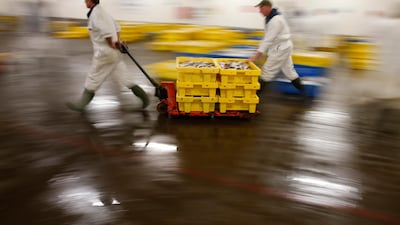British fisheries are just another UK industry in a state of limbo over exactly how Brexit will impact them in the long-run.
The UK’s fishing industry, traditionally concentrated in heartlands such as Grimsby, Whitby and Fleetwood, has been in decline for several years, with chronic overfishing in the 1980s and 1990s, as well as the EU’s controversial Common Fisheries Policy, seen as hastening its demise.
After decades of fishing under what they perceive as unfair quotas set by Europe, much of the industry supported the Brexit vote, grasping the opportunity to “take back control”. Some 93 per cent of the industry backed the vote in 2016 to leave the EU.
But it is not only British fishermen who have their eyes on increased fishing rights post-Brexit; indeed. some European fishermen think it is only fair they are permitted access to British fishing territories once a trade deal is struck between the UK and the EU.
“From our point of view, if they get free access to the European market, we should also have free access to fish in the British fishing zone,” Niels Wichmann, head of the Danish Fisherman’s Association told The Independent in September.
Indeed, the UK’s environment secretary Michael Gove, one of the leading government proponents for Brexit, was forced to concede that some European vessels would still be able to fish in UK waters after a new trade deal is struck.
The EU’s Common Fisheries Policy, introduced in 1964, allowed some European vessels to fish closer than ever before to the British coast, with UK vessels gaining greater access to European waters.
_______________
Read more:
Should UK's Grimsby become a free trade zone?
Brexit heartland remains defiant in face of economic warnings
_______________
British fisheries have long claimed that such an arrangement has had a negative impact on the UK. More than 683,000 tonnes of fish, valued at some £484 million (Dh2.5 billion), was caught by EU vessels in British fishing territory, whilst UK vessels caught only 111,000 tonnes worth £114m from the waters of EU waters.
Whilst a post-Brexit realignment of fishing rights in theory offers greater potential to the UK, many believe that access to some of Britain’s lucrative fishing grounds could be used as bait by Downing Street for far more significant parts of the Brexit breakup, with the fishing industry representing only 0.05 per cent of the country’s GDP.
Failure to come to a deal could be self-defeating for both sides, massive over-fishing in the 1980’s and 1990’s contributed to the demise of fishing industry in former heartlands such as Grimsby.
Meanwhile, the risk of new tariffs introduced on UK-caught fish brings more uncertainty. The country exports 75 per cent of the fish it does catch, much of it going to the EU. Not only would such tariffs harm the affordability of UK-caught fish, they would also potentially impact the price of cod, haddock and warm-water prawns – imported from the likes of Iceland and Denmark - beloved by Britons. The UK’s domestic market, in its current state, is simply unable to support the industry alone.
“From a British perspective, people just aren’t interested in the fish British vessels do catch, they have their tastes and favourites, it just happens that the big sellers are all caught outside of British waters. We have to buy them in”, says Ian Hadigan, a fishmonger from Grimsby.
Yet away from the economic arguments, the UK’s fishing industry remains defiant, proud of its achievements and determined to forge its own way following Brexit.
“We have to be responsible for the fish that is in our waters,” Whitby-based trawlerman Arnold Locker told BBC’s The One Show in December.
“I want guys to be rewarded for the hard work. We’ll be somebody again. You know, we’ll be fishing town again.”


